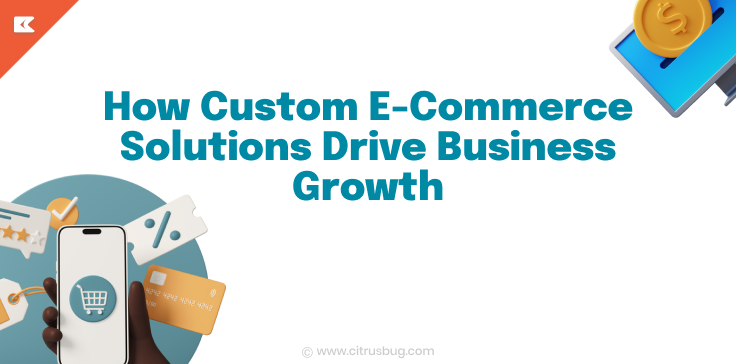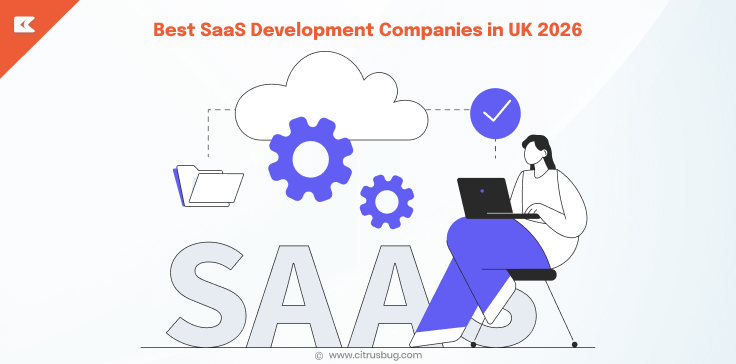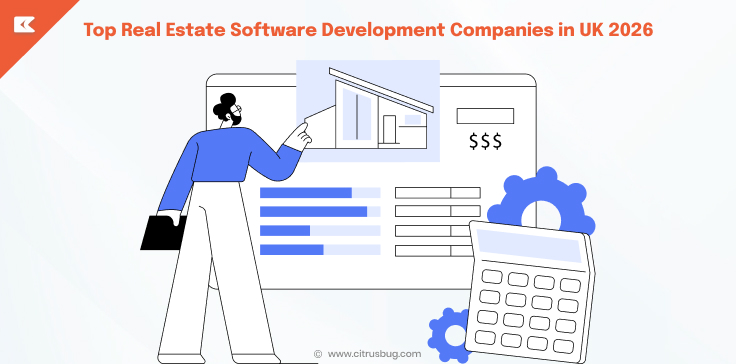How Custom E-Commerce Solutions Drive Business Growth
- December 12, 2024
-
4342 Views
- by Ishan Vyas

Building an e-commerce business is much more than building a minimal, basic online store. It involves building an experience that matters for your audience, scales up with growth, and answers unique needs of your industry. The secret to reaching this kind of goal is by developing a custom e-commerce solution. It allows companies to get away from ordinary off-the-shelf solutions and come up with their specific approach toward digital storefronts.
Let’s explore how custom e-commerce solutions can fuel business growth, from personalized shopping experience to seamless scalability and innovation.
What Are Custom E-Commerce Solutions?
Custom e-commerce solutions are custom-built platforms created for business-specific needs. This means, unlike off-the-shelf platforms such as Shopify, WooCommerce, or BigCommerce, where many businesses depend on ready-made tools or specialized WooCommerce development services, a custom solution allows companies to build a truly personalized shopping experience. The key benefits of using these customized solutions are their flexibility, scalability, and adaptation according to your business. These customized platforms adapt to your unique business requirements on operational, branding, and customer fronts.
By choosing a custom e-commerce solution, businesses can build a platform that suits their needs exactly, from complex integrations to unique customer interactions, ensuring they are not limited by the restrictions of pre-built systems.
Who Should Opt for Custom E-Commerce Solutions?
Custom e-commerce solutions help businesses that have specific needs that standard platforms cannot cover. The following are those businesses that will benefit significantly from a custom e-commerce site:
1. Businesses Operating in Niche Markets with Specific Needs
In the case of niche industries, be it luxury goods, specialized B2B products, or unique services a generic e-commerce platform may not provide enough flexibility to address the needs of the businesses. For niche industries, building a dedicated B2B marketplace can be a powerful strategy. Custom solutions allow businesses to create unique functionalities that are critical for their market, offer personalized customer journeys, customized pricing, and exclusive features.
2. Businesses Expecting Rapid Growth and Requiring Scalability
Custom platforms allow any business to easily expand its products and services, add or integrate new functionalities, as with integrating new payment gateways, adding multiple languages and currencies, or possibly supporting a higher traffic than usual during peak seasons.
3. Businesses Looking to Offer a Unique Shopping Experience
In today’s competitive e-commerce market, a personalized, standout shopping experience is what differentiates your business from others. Custom e-commerce platforms enable you to design an entirely unique online store that reflects the values, vision, and customer preferences of your brand.
Whether it’s through interactive AR features, loyalty programs, or a well-designed recommendation engine, custom solutions can allow you to include sophisticated features that enhance the shopping experience for visitors and make them loyal.
4. Businesses Requiring Specialized Integrations, Such as Complex Supply Chain Systems
Many business organizations require operations such as third-party tool integration for their inventory management, customer relationship management, shipping logistics, or ERP. Similarly, businesses with a physical presence can benefit from integrating tools like local citation services into their marketing strategy, helping improve visibility and consistency across directories. Custom solutions have the capability of seamlessly integrating such complicated systems; it saves operations with zero errors and from data silos. Custom Integrations like Shopify WhatsApp integration or WebMaxy Woocommerce integration are also among some available options for e-commerce businesses. For stores running promotional campaigns, managing a WooCommerce discount product setup becomes crucial. It helps in attracting more customers while also integrating smoothly with existing inventory and marketing systems, something a digital marketing SEO agency often considers when optimizing business strategies, something a digital marketing SEO agency often considers when optimizing business strategies
Custom solutions allow businesses to automate all the manual processes, where inventory levels are updated in real time, orders processed seamlessly, and customer data is central to the decision-making process.
5. Businesses Operating in Industries with Strict Compliance Regulations
Industries such as healthcare, finance, and legal services have high standards for compliance and data security. Those types of business may find that generic e-commerce platforms just do not have the needed level of security or customization to meet compliance requirements. With custom e-commerce solutions, businesses can tailor a platform to their needs for compliance with GDPR, HIPAA, PCI-DSS, and more industry-specific regulations.
Advanced security protocols, encryption, and features such as two-factor authentication (2FA) can be included in a custom platform to ensure that sensitive data is protected and that regulatory standards are met.
Key Features of Custom E-Commerce Solutions
1. Personalized User Experience
Customized e-commerce platforms offer businesses a creative avenue in which to build uniquely personalized customer journeys. Whether it’s product recommendations, customized pricing, or specialized flows at checkout, custom solutions offer the kind of flexibility to create an experience that resonates with your customers.
For example a beauty brand can offer a personalized skincare quiz that offers product recommendations based on a customer’s skin type, concerns, and preferences.
2. Scalability
Custom solutions grow with your business. As your business grows, a customised ecommerce platform adjusts to growing site traffic, new product lines and international expansion. You might add multilingual support or currency conversion and local payments seamlessly.
Example: An electronics retailer expanding globally might add those same features into its custom system and not need to migrate into some other system.
3. Third-Party Integration
Custom solutions can be made to integrate with third party tools such as CRM systems, marketing platforms, and ERP solution. By incorporating e-commerce SEO services and local seo services into these integrations, businesses can drive more organic traffic and improve their website’s search performance while maintaining operational efficiency. This way, operations do not have to face interruption and inefficiency due to unnecessary manual processes and reliance on multiple platforms.
An ecommerce company like shopify may integrate its system to the best shopify accounting software to automate its restocking, streamline order fulfillment and automating other accounting tasks.
4. Advanced Security
The more important aspect of building customer trust is security. Industry-specific compliance is included in the enhanced security features of custom e-commerce solutions, for instance, GDPR for European customers or HIPAA for health-related products.
If we talk about the healthcare industry as a health-focused e-commerce platform, data handling must be HIPAA compliant to protect sensitive information of the customers.
5. Unique Design and Branding
A customized e-commerce platform will assure that the design, layout, and overall user experience reflect your brand’s identity, making your store stand out within a crowded marketplace. It provides an experience that is cohesive in all touchpoints, ensuring your branding is consistent. You can also incorporate an AI logo, which will adapt to your branding in real-time, enhancing your store’s uniqueness and appeal.
Key Benefits of Custom E-Commerce Solutions for Business Growth
- More Than Just a Storefront: A Customized Experience
Generic e-commerce platforms provide the bare essentials but lack the flexibility to reflect your brand’s identity. Custom solutions allow businesses to create platforms that are tailored specifically to their vision, aligning perfectly with their values and goals.
For example, a luxury apparel retailer may include personalized shopping assistants and members-only access to provide a prestige experience that reinforces relationship brand.
- Scalability That Matches Your Growth Ambitions
As businesses grow, their e-commerce platforms need to scale up to handle increased traffic, an expanded product catalog, and changing customer expectations. Custom solutions are built with scalability in mind, so that during growth spurts or global expansions, operations are smooth.
Take ASOS, a global fashion retailer. Developing custom functionalities such as localized payment gateways and multi-language support helped ASOS scale successfully to cater to diverse international markets without compromising performance.
- Streamlined Operations with Tailored Backend Systems
Custom e-commerce platforms don’t just lead in user experience but also in backend operations. They have seamless integration with tools such as inventory management, shipping logistics, and CRM systems, ensuring smooth workflow and minimal manual intervention.
Zara is a good example of utilizing an advanced custom e-commerce backend to synchronize its real-time inventory with online and in-store sales, providing accurate stock availability and efficient order fulfillment.
- Standing Out in a Competitive Market
In a crowded e-commerce landscape, differentiation is everything. Custom platforms allow brands to provide unique features and innovative shopping experiences that generic platforms cannot easily match. Alongside this, businesses can use marketing mix modeling to better understand which marketing efforts drive results, helping them support their custom solutions with smarter investments.
Take IKEA, for example. This brand uses AR on its custom app to enable customers to see how furniture would look in their homes before buying it. Such a unique feature does not only boost conversions but also builds customer confidence in buying decisions.
- Enhanced Security and Compliance
E-commerce does not compromise on security and compliance. Custom platforms come with high-security measures aligned to industry regulation and business-specific needs, which may include fraud detection systems, secure payment processing, and compliance with standards such as GDPR and PCI DSS.
For example, Amazon includes sophisticated fraud prevention algorithms and encryption technologies to protect customer data and maintain compliance with global security regulations.
- Long-Term Cost Efficiency
Although there is an investment upfront for custom solutions, they reduce the long-run costs because one doesn’t need recurring subscription fees as well as avoid multiple third-party integrations. A business can reduce its cost and enjoy its unique platform aligned to the growth.
Nike developed an e-commerce solution entirely on its own instead of getting onto third-party marketplaces and tools. This would provide Nike to retain its full control and save its commission fee.
- Customer-Centric Innovation
Custom platforms will let businesses stay ahead of trends, innovate continuously, and enjoy feature benefits such as AI-driven product recommendations, gamified shopping, and voice search, which keep the customer engaged and loyal.
Sephora, for example, uses AI-powered tools on its custom platform to personalize its product recommendations based on preferences, thereby increasing sales and customer satisfaction.
Final Thoughts
Custom e-commerce solutions aren’t a technical investment but rather a strategic move to enable businesses to remain competitive and achieve sustainable growth. They are made to evolve with the business, catering to the ever-changing demands of customers and the market, scaled up in terms of infrastructure, and heightened in terms of security.
Custom e-commerce solutions offer the adaptability and creativity needed to thrive in today’s changing e-commerce environment, regardless of whether you’re a startup trying to find a niche or an established business hoping to expand internationally.
Are you prepared to jump? Let’s build something extraordinary together. Our SaaS business specializes in developing customized e-commerce solutions that produce tangible outcomes. Make contact with us right now to turn your idea into a reality.





 SaaS Development
SaaS Development Web Application Development
Web Application Development Mobile Application Development
Mobile Application Development Custom Software Development
Custom Software Development Cloud Development
Cloud Development DevOps Development
DevOps Development MVP Development
MVP Development Digital Product Development
Digital Product Development Hire Chatbot Developers
Hire Chatbot Developers Hire Python Developers
Hire Python Developers Hire Django Developers
Hire Django Developers Hire ReactJS Developers
Hire ReactJS Developers Hire AngularJS Developers
Hire AngularJS Developers Hire VueJS Developers
Hire VueJS Developers Hire Full Stack Developers
Hire Full Stack Developers Hire Back End Developers
Hire Back End Developers Hire Front End Developers
Hire Front End Developers AI Healthcare Software Development & Consulting
AI Healthcare Software Development & Consulting Healthcare App Development
Healthcare App Development EHR Software Development
EHR Software Development Healthcare AI Chatbot Development
Healthcare AI Chatbot Development Telemedicine App Development Company
Telemedicine App Development Company Medical Billing Software Development
Medical Billing Software Development Fitness App Development
Fitness App Development RPM Software Development
RPM Software Development Medicine Delivery App Development
Medicine Delivery App Development Medical Device Software Development
Medical Device Software Development Patient Engagement Software Solutions
Patient Engagement Software Solutions Mental Health App Development
Mental Health App Development Healthcare IT Consulting
Healthcare IT Consulting Healthcare CRM Software Development
Healthcare CRM Software Development Healthcare IT Managed Services
Healthcare IT Managed Services Healthcare Software Testing services
Healthcare Software Testing services Medical Practice Management Software
Medical Practice Management Software Outsourcing Healthcare IT Services
Outsourcing Healthcare IT Services IoT Solutions for Healthcare
IoT Solutions for Healthcare Medical Image Analysis Software Development Services
Medical Image Analysis Software Development Services Lending Software Development Services
Lending Software Development Services Payment Gateway Software Development
Payment Gateway Software Development Accounting Software Development
Accounting Software Development AI-Driven Banking App Development
AI-Driven Banking App Development Insurance Software Development
Insurance Software Development Finance Software Development
Finance Software Development Loan Management Software Development
Loan Management Software Development Decentralized Finance Development Services
Decentralized Finance Development Services eWallet App Development
eWallet App Development Payment App Development
Payment App Development Money Transfer App Development
Money Transfer App Development Mortgage Software Development
Mortgage Software Development Insurance Fraud Detection Software Development
Insurance Fraud Detection Software Development Wealth Management Software Development
Wealth Management Software Development Cryptocurrency Exchange Platform Development
Cryptocurrency Exchange Platform Development Neobank App Development
Neobank App Development Stock Trading App Development
Stock Trading App Development AML software Development
AML software Development Web3 Wallet Development
Web3 Wallet Development Robo-Advisor App Development
Robo-Advisor App Development Supply Chain Management Software Development
Supply Chain Management Software Development Fleet Management Software Development
Fleet Management Software Development Warehouse Management Software Development
Warehouse Management Software Development LMS Development
LMS Development Education App Development
Education App Development Inventory Management Software Development
Inventory Management Software Development Property Management Software Development
Property Management Software Development Real Estate CRM Software Development
Real Estate CRM Software Development Real Estate Document Management Software
Real Estate Document Management Software Construction App Development
Construction App Development Construction ERP Software Development
Construction ERP Software Development







